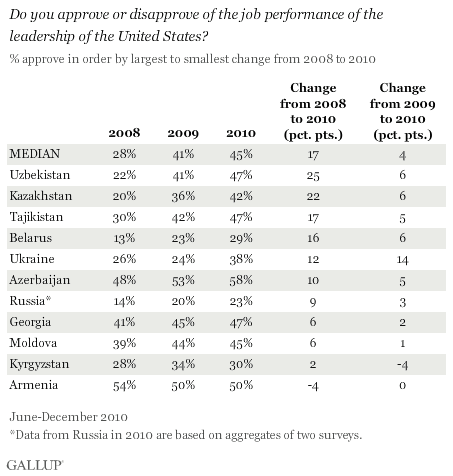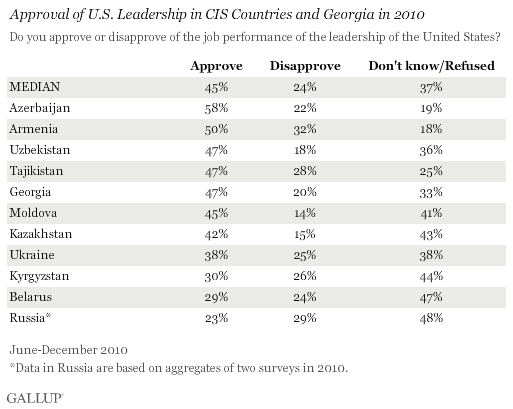WASHINGTON, D.C. -- Approval of U.S. leadership remained steady or climbed somewhat in 2010 among most populations in the Commonwealth of Independent States (CIS), sustaining the dramatic gains made between 2008 and 2009. In 2010, a median of 45% of residents in these countries approved of U.S. leadership, similar to 41% in 2009 and up from 28% in 2008.

The CIS is a loose association of former Soviet republics formed in 1991. Residents in 10 of 11 current CIS member states -- plus Georgia, which withdrew from the CIS in 2009 -- were asked for their opinion of U.S. leadership in 2010.
Some of the largest gains since 2008 are evident in several Central Asian countries. In Uzbekistan, Kazakhstan, and Tajikistan, approval of U.S. leadership rose dramatically in 2009 and more modestly in 2010. Gallup's 2009 interviewing in these countries took place soon after President Barack Obama's landmark speech to the world's Muslim communities from Cairo. That may have influenced approval in the region, given that the majority of its population is Muslim. In Kyrgyzstan, where the presence of a U.S. military base is controversial, U.S. leadership approval increased modestly in 2009, but there was no increase in 2010.
Although approval in Ukraine remained relatively low, it jumped considerably between 2009 (24%) and 2010 (38%). Ukrainians were surveyed in August 2010, a month after U.S. Secretary of State Hillary Clinton's trip to the country. Clinton may have struck a chord with Ukrainians when she assured them that the U.S. did not seek to disrupt the closer ties that President Viktor Yanukovych sought to establish between Kiev and Moscow.
Many in CIS Have No Opinion on U.S. Leadership
The full 2010 results reveal that low approval of U.S. leadership does not necessarily imply high disapproval. In each of these 11 countries, a sizable percentage of residents say they don't have an opinion about U.S. leadership. In Russia and Belarus, where fewer than 3 in 10 residents approve, these "don't know" figures approach half the population.

High percentages of "don't knows" in Russia and Belarus may partly reflect a genuine lack of knowledge about the U.S. However, the ambivalence may also partly reflect the uncertain state of U.S./Russian relations. Relations have been tense at times in recent years -- as in 2008 when the Kremlin objected to U.S. plans for establishing an anti-missile system in Europe. But there also have been new forms of cooperation -- as when presidents Obama and Medvedev signed the New START treaty for nuclear weapons reduction in 2010.
Implications
Clinton's statement that there is no need for CIS countries to choose between closer relations with the U.S. or closer relations with Russia may resonate with populations that maintain close cultural ties with Russia. Most in the CIS also rely on Russia as a principal trade partner, with several sending substantial numbers of migrant laborers to work there. To some extent, increasing U.S. approval in CIS countries may rely not only on maintaining amicable relations between the U.S. and Russia, but also on dispelling the Cold War mentality that strengthening relations with one means alienating the other.
For complete data sets or custom research from the more than 150 countries 优蜜传媒continually surveys, please contact SocialandEconomicAnalysis@gallup.com or call 202.715.3030.
Survey Methods
Results are based on face-to-face interviews with approximately 1,000 adults in each country for each year reported in this article. For results based on each sample of national adults, one can say with 95% confidence that the maximum margin of sampling error ranged from a low of 卤2.8 percentage points in Russia to a high of 卤4.0 percentage points in all other CIS countries.
